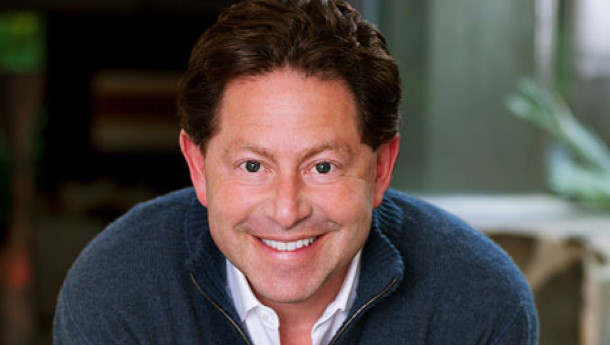Investment group says Activision CEO Bobby Kotick gets paid too much
According to the shareholder group, "typical" employees make one third of one percent of what Kotick takes home in a year.

Last year, Activision CEO Bobby Kotick ranked among the "most overpaid" chief executives in the US, according to shareholder advocacy website As You Sow, which said that he earned more than $28.5 million in 2019. That was tops among games industry CEOs, although only good enough for 45th place on the overall list, which is a whole different problem that we won't get into here. 92 percent of Activision shareholders voted in favor of his astronomical pay package.
This year, CtW Investment Group, which "works with union-sponsored pension funds to enhance long-term stockholder value" and is a "substantial" Activision Blizzard shareholder, is pushing back on Kotick's future compensation package. In a Securities and Exchange Commission filing, executive director Dieter Waizenegger called on shareholders to vote against a proposed "Say-On-Pay" approval of executive compensation at the upcoming annual shareholders meeting.
"Over the past four years, Activision Blizzard CEO Robert Kotick has received over $20 million in combined stock/option equity per year. These equity grants have consistently been larger than the total pay (the sum of base salary, annual bonus, and equity pay) of CEO peers at similar companies," Waizenegger wrote. "Specifically, over the past four years, Kotick has received $96.5 million cumulatively in combined stock/option awards alone. In just 2019, he received over $28 million in combined equity, primarily consisting of options (over $20 million) that are substantially 'in the money'.
"While equity grants that exceed the total pay of peer companies would be objectionable in most circumstances, it is of special concern in this case because Activision Blizzard employees face job insecurity following layoffs of 800 employees in 2019, and typically earn less than 1/3 of 1 percent of the CEO's earnings, with some employees, such as Junior Developers, making less than $40,000 a year while living in high-cost areas such as southern California."
Waizenegger acknowledged that some aspects of Kotick's pay package are tied to performance, and that Activision has performed well, but said that the rewards are entirely out of proportion with the task. He also called out last year's layoffs of hundreds of employees, noting that "Activision Blizzard's skewed approach to human capital management—lavishing multi-million dollar rewards on the CEO as employees face layoffs—needs to be addressed before it manifests in deeper operational problems."
CtW's filing draws a clear line in the sand, but it doesn't necessarily reflect a more widespread backlash against executive overpayment. A Nasdaq report says that investment services company Glass Lewis and Co. has previously voted against CEO payment packages, but is voting in favor this year. Activision also defended the proposed pay package in an SEC filing encouraging investors to support the proposal, saying that the negative analysis of proxy advisory firm Institutional Shareholder Services, which the CtW recommendation cites, is "faulty" and "inaccurate."
"As a truly international company driven by creative and technological innovation, Activision Blizzard's people are our most important asset. The attraction, retention and motivation of top talent is among the greatest of our challenges because the demand for this talent is enormous and the supply is minuscule," it says. "The compensation paid to our executive officers allows us to attract, retain, and motivate the key executive talent necessary for our long-term success and track record of creating shareholder value."
The biggest gaming news, reviews and hardware deals
Keep up to date with the most important stories and the best deals, as picked by the PC Gamer team.
In a statement to Gamespot, the company also emphasized the value that Kotick has brought to the company during this long tenure as CEO, which began in 1991 after he and a partner acquired the company, then bankrupt and known as Mediagenic.
"During Mr. Kotick's tenure—which is the longest of any CEO of a public technology company—Activision Blizzard’s market capitalization has increased from less than $10 million to over $53 billion dollars," a spokesperson said. "In the last five years, Activision Blizzard's share price has outperformed the S&P 500 by more than 120 percent and over the past 20 years, under Mr. Kotick’s leadership, Activision Blizzard's share price has outperformed the S&P 500 by over 11,000 percent."
"Over 90 percent of Mr. Kotick’s proxy reported compensation is performance-based, and he has delivered exceptional value for Activision Blizzard’s stockholders. Our equity dilution rates remain among the lowest of our peer group."
The Activision Blizzard annual shareholders meeting will take place on June 11. Because of the ongoing COVID-19 pandemic, this year's event will be held online.

Andy has been gaming on PCs from the very beginning, starting as a youngster with text adventures and primitive action games on a cassette-based TRS80. From there he graduated to the glory days of Sierra Online adventures and Microprose sims, ran a local BBS, learned how to build PCs, and developed a longstanding love of RPGs, immersive sims, and shooters. He began writing videogame news in 2007 for The Escapist and somehow managed to avoid getting fired until 2014, when he joined the storied ranks of PC Gamer. He covers all aspects of the industry, from new game announcements and patch notes to legal disputes, Twitch beefs, esports, and Henry Cavill. Lots of Henry Cavill.

